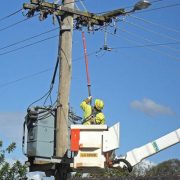What’s the Difference Between Non-Insulated and Insulated Travel Towers?
Travel Towers are arguably the most versatile elevated work platforms. Fit for the open road yet still great for awkward spaces and tight site envelopes, they offer large working loads and safe and stable platform bases.
Little wonder, then, that they are one of our most popular equipment hires. Force holds a large fleet of insulated and non-insulated travel towers, and while non-insulated travel towers tend to be larger and able to handle heavier loads, the key difference is that insulated travel towers offer protection against electric shock. They are designed so that key operating parts are covered in non-conductive protective materials.
Travel Tower Hire
Travel tower hire is a necessity in numerous workplaces, with insulated travel towers being particularly in-demand for lighting maintenance, power distribution networks, telecommunications and broadcasting. Non-insulated travel towers are in high demand for civil engineering projects, mining, construction and horticulture.
Force has a fleet of non-insulated travel towers from 25 to 62 metres in reach and insulated towers with a reach of 13 to 28 metres, with a choice of two or four wheel drive and all-terrain towers. Standard features include self-levelling abilities, Roll Over Protection Systems, zero tail swing and a large basket capacity. So, how do you decide which travel tower hire is right for you?
Insulated Travel Towers
Insulated travel towers are designed for use in situations where the basket or tower is likely to come into contact with live electrical wires. Insulation, in this case, refers to material used in the construction of the travel tower to protect against the risk of electric shock. The insulation is applied to the lifting arm of the travel tower as well as the basket.
Force’s fleet of insulated travel towers have insulation ratings from 5 to 132 kV, meaning they can offer protection to your workers when operating close to power lines, cables and other conductive materials. The insulated travel towers in the Force fleet offer a basket capacity of up to 270 kilos and feature reversing alarms and cameras for increased manoeuvrability and safety when working on site.
Non-Insulated Travel Towers
As you might expect, Non-Insulated travel towers don’t offer protection against the risk of electric shock. However, the choice of size, load and reach among Force’s fleet of non-insulated travel towers is broader. Force offers non-insulated travel towers with a reach of between 25 metres and a staggering 62 metres, making these extremely versatile EWPs. The outreach on larger models extends up to an impressive 32 metres, and basket capacities of 500 to 600 kilograms are not unusual.
Travel towers are real workhorses and are used by a huge array of businesses and organisations. They are often the only practical choice where construction sites are cramped, level terrain hard to come by and obstacles difficult to navigate, and for remote projects. They are the ultimate mobile construction solution.



